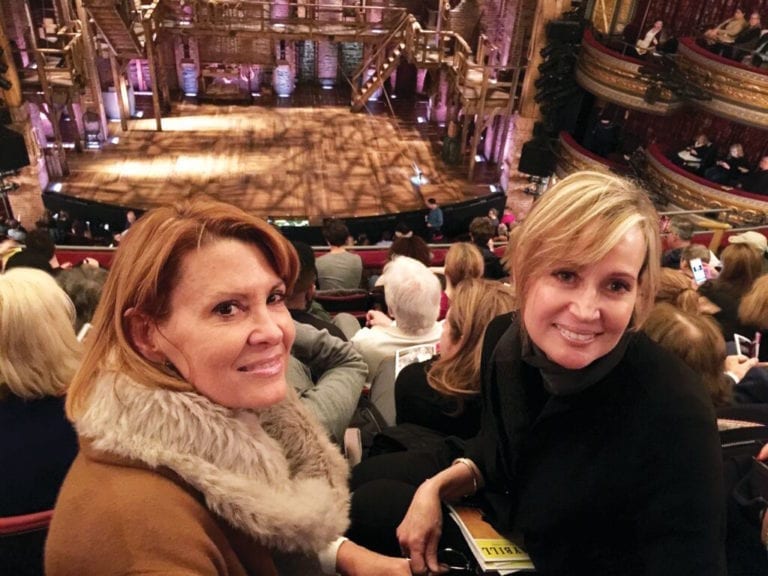Broadway’s toughest ticket explores three inspiring women in the life of Alexander Hamilton

Cover of the “Hamilton” playbill.
Hamilton the Play
In the playbill for the acclaimed Broadway production of Alexander Hamilton the musical, Carey Purcell accurately credits the three leading ladies as major contributors to the Grammy-award-winning hit show. As she explains, while sharing a dressing room during the musical’s Off-Broadway run, this inspired trio composed songs from “a couple of beats,” harmonizing, inventing, and creating their own songs. In the show, Phillipa Soo plays Hamilton’s wife, Eliza; Renee Elise Goldsberry plays her sister Angelica; and Jasmine Cephas Jones plays Maria Reynolds, the woman that leads Alexander Hamilton into the nation’s first sex scandal.
How long is Hamilton?
Alexander Hamilton the musical only takes 2 hours and 40 minutes to chronicle the highlights of the dynamic life of Alexander Hamilton – Taking on telling the tale of everything from his youth, his climb to political power, and the impact 3 key women had on his life.
The Inspiring Women in Alexander Hamilton the Musical
The inspiring women of Hamilton are not just the leading ladies in this musical. Much like the original three women they portray in the play, each woman is an instrumental force in the successful formation of this production. The musical, for all intents, is about America’s Founding Fathers. Inspired by Ron Chernow’s biography chronicling Hamilton’s life throughout the Revolutionary War, the musical asserts that the true hero is not only the legendary Alexander Hamilton but also his wife Eliza Hamilton. It is about the men who built this country, and specifically Alexander Hamilton, who founded our nation’s banking system among other acts of genius. But the musical also recognizes the ways in which women were overlooked, legitimizing their place in history. Eliza Hamilton is the collateral beneficiary of her husband’s work.
Women’s’ Roles in the 18th Century
Throughout the musical, we are reminded again and again of Eliza, the “benevolent” one, and her sister Angelica, the “politically intelligent” one. Both deserve admiration, respect, and acknowledgment. The play recognizes that in the 18th century, both intellectually driven and traditionally feminine women were trapped. Angelica exists in a world where she is not accepted and cannot be involved in the kind of political work that would be of interest. On the other hand, Eliza does the kind of domestic work she loves but lives in a time when this work is not respected and is viewed as significantly less important than the political work Hamilton does. Eliza is benevolent, gracious, and compassionate.
Eliza, from a tight-knit family, marries Alexander, an orphan, the Founding Father without a father. The musical portrays a man unable to process the needs of his wife, having never experienced the role of a family. Eliza encourages Alexander to realize there is as much legacy and dignity in being a good husband and father as there is in birthing a nation. Early in the musical, Angelica warns her sister that Hamilton will never be “satisfied,” one of the musical hits of the play. Yet, Eliza weathers years of Hamilton leaving her — for war, for George Washington, for other political quests, and for Maria Reynolds, the woman exposed in the nation’s first sex scandal. The complexities surrounding Maria and her fall are equal to the resilience of Eliza Hamilton.
Alexander Hamilton the Musical and Women’s Historical Narrative
With the recent death of Nancy Regan, attention has been drawn to “image control,” specifically her awareness of the long-lasting implications of the press and history perspective. Likewise, even though their marriage endured, Eliza burned all of the letters from her husband, representing a kind of reserve and discipline unique to that epoch. Destroying historical documents is seen by some as an astute act, but Eliza invests in her own legacy, challenging history to dictate who she was. Her inner strength may have driven her to control her image by removing any record of herself until she chose to chronicle her husband’s life long after his death. Centuries ago, Eliza chose to forge her own destiny with her unique way of recording history.
Eliza’s sheer will and strength were reflected in the 18th and 19th centuries. She lived decades in widowhood, taking care of the couple’s eight children with scant money and property. Her focus was twofold: building better lives for their children through preserving Alexander’s place in history and leaving a quiet legacy from her own deeds. According to historical archives, Eliza and her children took more time to “sort through” Alexander Hamilton’s thousands of pages of writing than the 49 years he spent drafting the documents.

Linda Mallis and Karen Floyd before a performance of Lin-Manuel Miranda’s production of “Hamilton.”
Eliza’s Quiet Political Influence
During Hamilton’s life, Eliza quietly wrote political essays and corresponded with heads of state on her husband’s behalf — in addition to raising a family of eight children. After Alexander’s death, Eliza started the New York Orphan Asylum Society to care for orphans like her husband. The home still serves children today as the Graham Windham. She began the Hamilton Free School, the first free school in Washington Heights. Eliza and Dolly Madison also were acknowledged for raising money for the Washington Monument.
Eliza’s life is defined by her strength, goodness, perseverance, and reserve. She ensured the legacy of her husband and chose not to be defined by others. Mrs. Hamilton safeguarded an important part of history that will last forever.
Pictured in the header: A crowd gathers outside the Richard Rodgers Theatre in New York before a performance of “Hamilton,” the latest in a long line of hit shows to grace its stage. The theatre was built in 1925 by Irwin Chanin as the 46th Street Theatre. Since opening, it has hosted more Tony award-winning Best Musicals and Best Plays than any other theatre on Broadway. In 1990, the theatre was renamed to honor the legendary Broadway composer, Richard Rodgers, whose music and shows were loved by theatre- and movie-goers the world over
By Linda Mallis
Editor’s Note: To learn more about the Broadway show Hamilton, check out the Broadway website.


